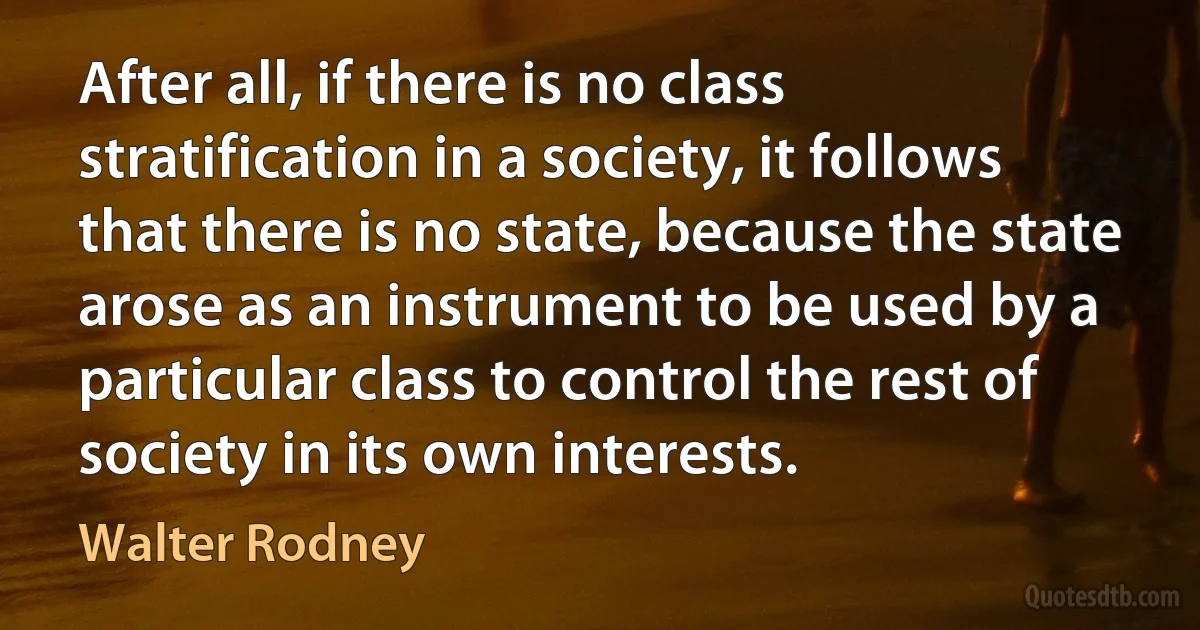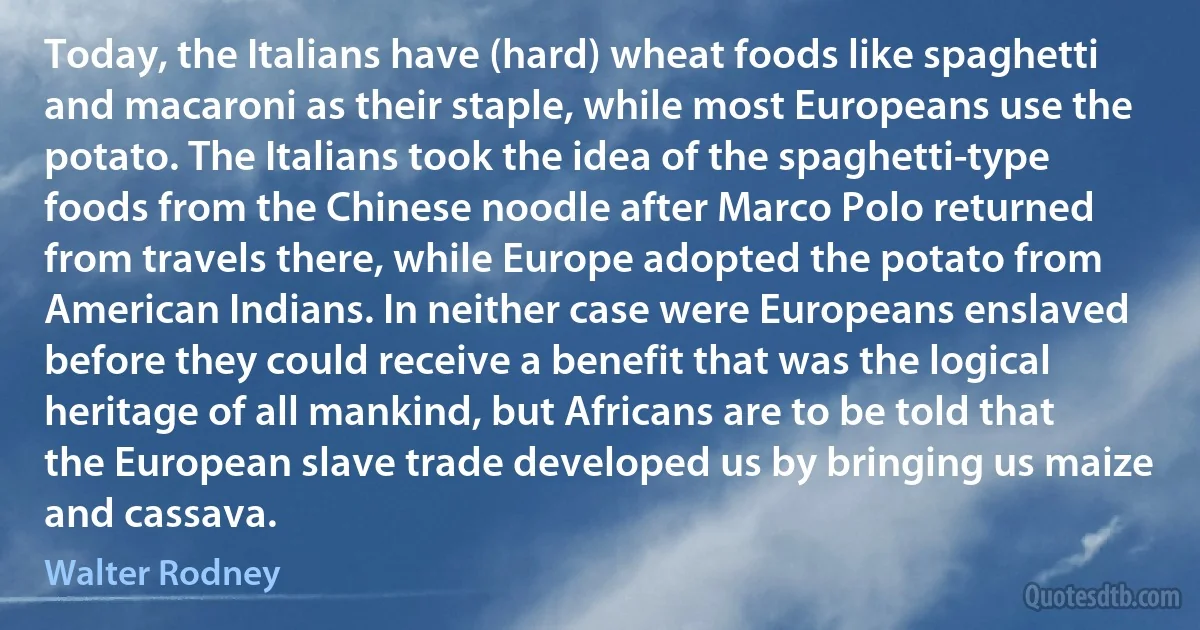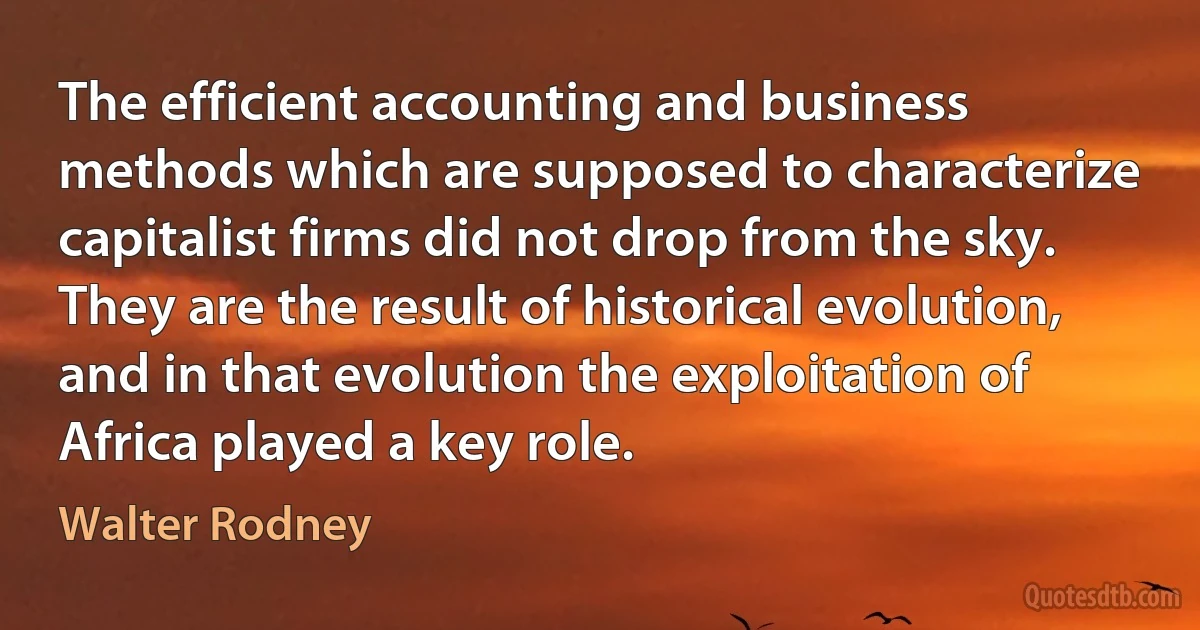Walter Rodney quotes
As late as 1959, a friend and colleague of Albert Schweitzer defended his unsterile hospital in the following terms: Now to the domestic animals at the Hospital. People have been shocked by the informality with which animals and people mix, and although it is perhaps not always defensible on hygienic grounds, the mixture adds considerably to the charm of the place. The writer was a dental surgeon from New York, who would obviously have had a fit if a goat or chicken had wandered into his New York surgery. He knew full well that at Schweitzer's hospital "the goats, dogs and cats visit hospital wards teeming with microbial life of the most horrifying varieties,” but he defended their habitation with Africans because that was part of the culture and charm that had to be preserved!

Walter Rodney
Capitalism has created its own irrationalities such as a vicious white racism, the tremendous waste associated with advertising, and the irrationality of incredible poverty in the midst of wealth and wastage even inside the biggest capitalist economies, such as that of the United States of America.

Walter Rodney
When Europeans put millions of their brothers (Jews) into ovens under the Nazis, the chickens were coming home to roost. Such behavior inside of "democratic” Europe was not as strange as it is sometimes made out to be. There was always a contradiction between the elaboration of democratic ideas inside Europe and the elaboration of authoritarian and thuggish practices by Europeans with respect to Africans.

Walter Rodney
The principal contradiction within capitalism from the outset was that between the capitalists and the workers. To keep their system going, the capitalists had constantly to step up the rate of exploitation of their workers. At the same time, European workers were gaining increasing mastery over the means of production in the factories and mines, and they were learning to work collectively in big enterprises and within their own trade union structures. If the bourgeoisie continued to deprive them of the major part of the fruits of their own labor and to oppress them socially and politically, then those two classes were set on a collision path. Ever since the mid-nineteenth century, Marx had predicted class collision would come in the form of revolution in which workers would emerge victorious. The capitalists were terribly afraid of that possibility, knowing full well that they themselves had seized power from the feudal landlord class by means of revolution.

Walter Rodney
There were no roads connecting different colonies and different parts of the same colony in a manner that made sense with regard to Africa's needs and development. All roads and railways led down to the sea. They were built to extract gold or manganese or coffee or cotton. They were built to make business possible for the timber companies, trading companies, and agricultural concession firms, and for white settlers. Any catering to African interests was purely coincidental.

Walter Rodney
African rulers found European goods sufficiently desirable to hand over captives which they had taken in warfare. Soon, war began to be fought between one community and another for the sole purpose of getting prisoners for sale to Europeans, and even inside a given community a ruler might be tempted to exploit his own subjects and capture them for sale. A chain reaction was started by European demand for slaves (and only slaves) and by their offer of consumer goods-this process being connected with divisions within African society.

Walter Rodney
The capitalists misinformed and miseducated workers in the metropoles to the point where they became allies in colonial exploitation. In accepting to be led like sheep, European workers were perpetuating their own enslavement to the capitalists. They ceased to seek political power and contented themselves with bargaining for small wage increases, which were usually counter-balanced by increased costs of living. They ceased to be creative and allowed bourgeois cultural decadence to overtake them all. They failed to exercise any independent judgment on the great issues of war and peace, and therefore ended up by slaughtering not only colonial peoples but also themselves.

Walter Rodney
Fascism was a monster born of capitalist parents. Fascism came as the end-product of centuries of capitalist bestiality, exploitation, domination, and racism-mainly exercised outside Europe. It is highly significant that many settlers and colonial officials displayed a leaning towards fascism. Apartheid in South Africa is nothing but fascism.

Walter Rodney
In a way, underdevelopment is a paradox. Many parts of the world that are naturally rich are actually poor and parts that are not so well off in wealth of soil and sub-soil are enjoying the highest standards of living. When the capitalists from the developed parts of the world try to explain this paradox, they often make it sound as though there is something "God given” about the situation.

Walter Rodney
Development means a capacity for self-sustaining growth. It means that an economy must register advances which in turn will promote further progress. The loss of industry and skill in Africa was extremely small, if we measure it from the viewpoint of modern scientific achievements or even by standards of England in the late eighteenth century. However, it must be borne in mind that to be held back at one stage means that it is impossible to go on to a further stage. When a person was forced to leave school after only two years of primary school education, it is no reflection on him that he is academically and intellectually less developed than someone who had the opportunity to be schooled right through to university level. What Africa experienced in the early centuries of trade was precisely a loss of development opportunity, and this is of the greatest importance.

Walter Rodney
Even the widespread resort to shifting cultivation with burning and light hoeing was not as childish as the first European colonialists supposed. That simple form of agriculture was based on a correct evaluation of the soil potential, which was not as great as initially appears from the heavy vegetation; and when the colonialists started upsetting the thin topsoil the result was disastrous. The above remarks show that when an outsider comes into a new ecological system, even if he is more skilled he does not necessarily function as effectively as those who have familiarized themselves with the environment over centuries; and the newcomer is likely to look more ridiculous if he is too arrogant to realize that he has something to learn from the "natives.”.

Walter Rodney
The mulatto sons of white traders and the sons of African rulers were the ones who made the greatest effort to learn the white man's ways. This helped them to conduct business more efficiently. One Sierra Leone ruler in the eighteenth century explained that he wished "to learn book to be rogue as good as white man”; and there were many others who saw the practical advantages of literacy. However, the educational process also meant imbibing values which led to further African subjugation. One West African educated in this early period wrote a Ph. D. thesis in Latin justifying slavery. That was not surprising. The Reverend Thomas Thompson was the first European educator on the Gold Coast, and he wrote in 1778 a pamphlet entitled, The African Trade for Negro Slaves Shown to be Consistent with the Principles of Humanity and the Laws of Revealed Religion.

Walter Rodney
Instead of speeding up growth, colonial activities such as mining and cash-crop farming speeded up the decay of "traditional” African life. In many parts of the continent, vital aspects of culture were adversely affected, nothing better was substituted, and only a lifeless shell was left.

Walter Rodney



